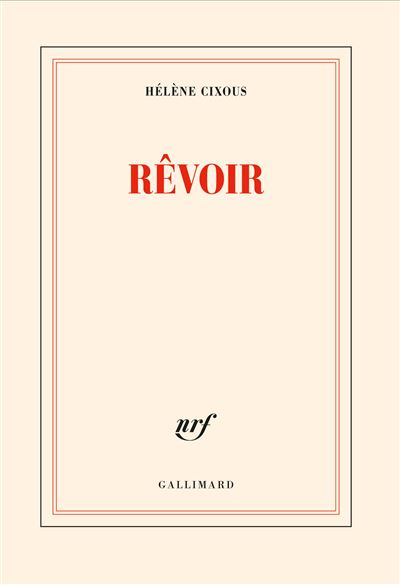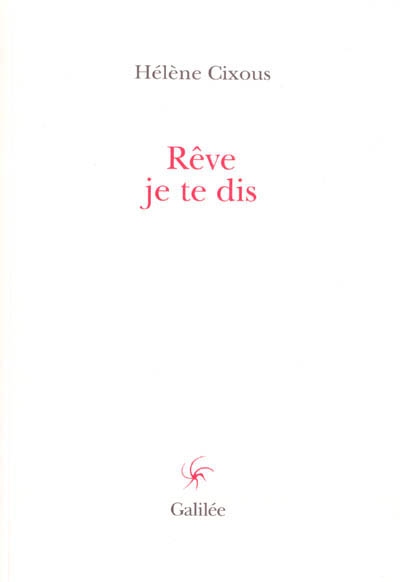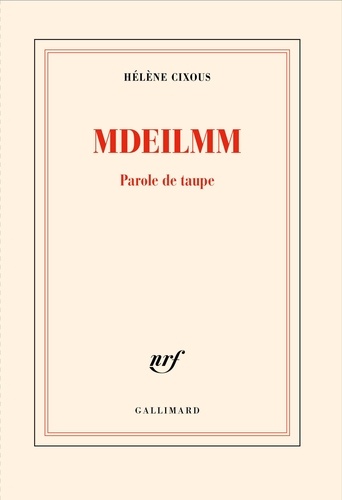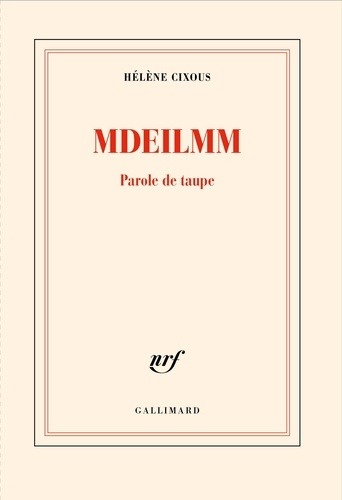Lhe title of this book by Hélène Cixous is unpronounceable and incomprehensible: Mdeilmm. There are indeed letters there, there is what seems to be a word, something which seems linked to language. However, we do not grasp any meaning, we do not see any object that would be the referent of this “word”. This title speaks of the escape of language, of asignificance, of the floating of meaning not outside of language but in language itself, through language.
Mdeilmm, it is language before language, language before language, before it signifies, before it refers, before meaning becomes fixed, freezes. The writing of Hélène Cixous is the deployment of this “before”. Through this writing, language becomes a flow by definition mobile, constantly unstable; the meaning there is elusive, disseminated; the world is no longer an object, it is no longer a collection of objects; consciousness and thought are lost, wander; the places established and protected by the order of language are erased: the exclusive sharing of the world, of Being, of subjectivity; the divisions between possible and impossible; the hierarchies between the intellectual and psychic faculties; the rules of grammar which are policing…
Although the book is written in French, it is not for Hélène Cixous to write in French (to reproduce the national language of the national story). It’s about writing like a mole, writing a mole-speech, writing like Shakespeare’s ghost speaks, like the dead or dreams speak, writing like someone who doesn’t speak French writes yet in French: not by speaking “badly” but by making French the medium of another strange, foreign language.
Recalling, as Hélène Cixous does, that several languages were spoken in her family (French, German, etc.), is undoubtedly less an opportunity to highlight de facto polyglotism than to mention this other fact: none of these languages was not self-evident, was not obvious, each being surrounded by others that are just as possible or currently spoken, each one being able to be invested by others, to mix with others (“Mdeilmm” is “ like the sound of a collision between two languages “). No obvious language, no obvious order of language, but a plurilingualism which cannot be resolved into any linguistic (and political, and ontological) monopoly, which opens up language to concern, questioning, dissemination: no language is the language, the relationship between these spoken languages creating between them an outside of language, another silent language defined by the disorder of language, by its instability, by the fluctuation of the signifier, its plurality, the flight of each language towards other sounds, other grammars, other meaning. If this plurilingualism makes possible a singular dynamism in the language, if it brings out an environment by which each language is disturbed, it also creates, and in an even more paradoxical way, a language which is not one, a language before language and which inhabits each as its silence, its dumbness, its process of negation and displacement, of dissemination. Language is another language, speech is a hybridization that brings language out of itself, maintains it in this outside, in this “before” language. This “before”, this outside is no language but the dissemination of any language, the nomadization of any language. It is this dissemination, this nomadization that Hélène Cixous writes, this silence as language.

The title Mdeilmm is the index of this singular system of language, of the relationship to language implied by the writing of Hélène Cixous. In the book, “Mdeilmm” is the “word”, the sound, pronounced by Shakespeare in response to a question posed by Victor Hugo during a seance. The book revolves around this “word” as around an empty center, language revolves around this asignifying space, within language and yet outside language. This “word” functions as a strange attractor from which writing unfolds, always mobile and fleeting, writing inseparable from the relationship of language to this attractor which undoes it as language, which erases it, disseminates it, destroys it. to impose on him, precisely, writing. The word “Mdeilmm”, the disorder and the dynamisms it imposes on language are valid for what happens to language in this book as in the other books by the author, what happens being precisely writing.
By this writing, Mdeilmm deploys new powers of language, singular becomings, a singular world, a singular life. Writing joins the dream, the powers of the dream, its logic, its processes. If there is in Mdeilmmdream stories, it does not mean that writing must become a dream story. Becoming a dream, writing-dream, the text undoes the narration, the common narrative logic in favor of an infinite wandering, an erasure of the markers of the narration. Identities blur, overlap, unravel for cascading becomings: the I of the story becomes the book, mouse, H., child, cry, cat, etc. The death of the father becomes the death of Yitzhak Rabin, becomes the death sentence for a character by Dostoyevsky, becomes… Here, becoming, as with Deleuze, is not the passage from one identity to another but the in-between, the indistinguishable zone of the encounter: it is not that the father is identified with Rabin but between the two something is exchanged, something is created, a resonance, a third term which makes them indistinguishable. Hélène Cixous’s writing is made up of these incessant becomings (” we move at the speed of dreams through free metamorphoses “), of these echoes or resonances, of these shifts which destroy the fixed terms, the exclusive identities (“ is it my father or Kafka? “), the logical or ontological separations, the most anchored psychic patterns…
Everything is mobile, double or triple, everything is turned towards another, towards something else that it becomes, with which it becomes, opening up new and unprecedented lines. As language is another language, everything is another thing, and yet another. The meaning floats, the signification scatters like sand, the sentence becomes cloudy, affirms several segments strangely juxtaposed or intertwined (” The cry-child is me, the Book that is gripped by fits of terror “), sinks into itself to unfold what it contains as other strange and foreign elements.

Just as the dream is suffered, the dreamer is dispossessed of himself as of his dream, of his spirit, in Mdeilmm writing is suffered, it is received according to an essential passivity. To write is to receive writing, it’s like hearing voices, perceiving relationships that you would never have thought of, it’s being led into a world that you would never have created. Hélène Cixous multiplies the narrative instances, links what is stated to diverse, plural origins: says the son, says the daughter, says the book, says Shakespeare, say I, say the dead, says Isaac, etc. Appears in the book a strange character, writer and medium, who transcribes the messages dictated by the dead, this character being like the double of the writer HC, her more explicit definition, the highlighting of the relationship to writing which implies that the one who writes receives the writing, follows it in its bizarre lines, in its unknown landscapes, in its mad implications – the writing being what writes and of which the writer is the medium, as the dreamer is caught in the flow of his dream more than he discovers or produces the meaning of a message.
The other central location of the book is death. But, like “Mdeilmm”, death is an empty place, an empty centre, an attractor which acts on language but is not in language, cannot be said. In Mdeilmmdeath is also the thing », that which has no name, which is silence. This silence is nevertheless active, it is not simply an absence of sounds, of words, it is what, like “Mdeilmm”, acts on language, undoes it as much as it arouses it, makes it proliferate (“ I find that I can’t speak it, I say, it makes me speak “). Not being able to say obliges to say, to seek to say in a constantly renewed and “mad” way, wandering, since no term is possible that would allow us to stop speaking, that would finally allow us to say, once and for all . Death is that which has no name, it is that outside of language which inhabits language and makes it writing. To write is to write death, to write the strange life of language animated by mortal force.
In fact, in Mdeilmm, the dead come back, the dead speak, they are there, in this book which becomes their place, the world where they live their strange life as dead.es, absent.es and present.es but not quite made, absent and present according to a bizarre regime of presence and absence, unsituable and polymorphic – abnormal characters who, like writing, undo the stable coordinates of Being, the obvious distinctions of thought , the laws of language. And, just as the “characters” of the book, the dead men and women of the book, are present-and-absent, death-writing corresponds to a state of language in which it cannot be entirely present. to itself: language affirms and effaces itself, it affirms itself and searches for itself, it says and denies what it says, it is there but at the same time never ceases to be elsewhere, to always flee elsewhere, elusive. Hélène Cixous’s book is like a forest populated by new creatures, incoherent phenomena, a forest in this world and yet outside of this world, a mobile forest in which one can only get lost, of which one can only listen strange breathing, the strange murmurs. It is death that speaks there, it is the dead who speak there, Hélène Cixous writing, transcribing these words, these murmurs.

The book is the place where the dead return, where they can return, and whose “return” persists, lasts at least the time of the book, each time the book is opened, read. It is the action of the book, its power, more than its meaning. For Hélène Cixous, it is a question of writing with this power, of writing with the dead, of writing with death this writing-mole since the mole is also this animal which, like the dead, lives underground. Is the challenge learning to die? It is certainly a question, through writing, of approaching this event of each life, that of her own life, that of Hélène Cixous’ own life. But it is probably above all a question, for Hélène Cixous, as a writer, of deploying the life of language produced by death, the life of dream-writing, of mole-writing, of including the death in the language to breathe into it the living nomadism of writing. Still life, therefore, before the event of the end – the book ending with this polysemic phrase: ” I won’t go any further »…
Helene Cixous, Mdeilmm – Mole speechGallimard editions, October 2022, 176 p., €17 — Read an excerpt
Similar items
We want to give thanks to the author of this write-up for this outstanding content
The writing-dream of Hélène Cixous (Mdeilmm – Word of a mole)
Take a look at our social media accounts along with other pages related to themhttps://nimblespirit.com/related-pages/

